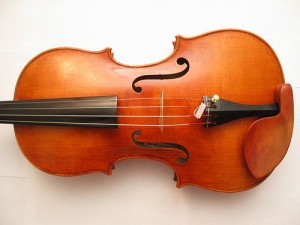Viola Lesson
 Why do people tremble with fear when someone comes into a bank carrying a violin case? They think she’s carrying a machine gun and might be about to use it. Why do people tremble with fear when someone comes into a bank carrying a viola case? They think she’s carrying a viola and might be about to use it.
Why do people tremble with fear when someone comes into a bank carrying a violin case? They think she’s carrying a machine gun and might be about to use it. Why do people tremble with fear when someone comes into a bank carrying a viola case? They think she’s carrying a viola and might be about to use it.
Did you hear about the violist who played in tune? Neither did I.
Why did the violist marry the accordion player? Upward mobility.
I feel a little dirty sharing these self-deprecating jokes with you because I do actually self-identify as a violist. But the sad truth is that I think violists kind of love these jokes because they’re really the only time anyone ever pays attention to us. Sad face!
You might have noticed that I did not grow up to be a great professional violist. But there were lessons I learned as a violist that have shaped who I am and how I live my life. One of those lessons has to do with courage, and I’ve been thinking about that viola lesson lately.
As you know, last week I was at annual conference. While I was there, I did something I had never done before. I raised my orange paper to get the attention of the bishop, and I stood at a microphone on the conference floor and made an argument for a controversial petition. And it was scary for me. It was scary for me because I was standing up for a belief that some people did not agree with, and I was saying something that some people might even be offended by. And I was plagued by all the doubts that assault us when we do or say something risky. What if I make a mistake? What if this isn’t the right time? What if I hurt someone with my words? What if I lose something by saying this? There are so many legitimate excuses that we can come up with to be silent and timid and static.
So here is where my viola lesson comes in. In Mrs. G’s middle school orchestra class, there were always passages in Beethoven or Mendelssohn that were harder than the rest, measures we hadn’t practiced enough to make perfect, notes we did not yet feel totally confident with. And, as the music flowed into those spots, our fingers would tighten, our bows would lighten, our cheeks would rise into a self-conscious cringe, and the sound coming out of our instruments would tiptoe through those measures, waiting for them to quietly pass.
In those moments, Mrs. G would stop the orchestra and teach us a lesson that I have carried around in my pocket for decades. She would look at the careful and timid culprits who had shied away from the hard notes, and—in her sweetest voice—she would say, “If you’re going to make a mistake, make it boldly.”
Now, I am a self-avowed, practicing perfectionist with unrealistically high standards for myself. So making mistakes is something I avoid like the plague. And making bold mistakes is most certainly out of the question. It would always feel better for me to be quiet and timid, to tiptoe around my real opinions and thoughts. That way, there would never be a risk of causing discord or atonality with anyone else.
But, as I have matured, I have found that the people I admire most in the world are people who live boldly, who press hard on the strings when called to do so and, with fear and trembling, play their part with volume. And sometimes they do mess up. Sometimes they play a wrong note or cause unnecessary discord or make improvised choices that others cringe at. But they keep that bow moving and the music going because they have a part to play in the creation of beauty and truth.
This is a lesson I take into the Christian life—to live boldly. To speak and do what we are called to with courage, even if we risk making some loud mistakes on the way. Today, I want to encourage you to live life boldly—whatever that might look like for you. Maybe it’s saying something that you have been afraid to say to a coworker or loved one. Maybe it’s speaking up when people make racist or sexist or homophobic comments. Maybe it’s making a major change in the way you live.
I want to end with a poem that I believe God brought into my life just before annual conference. It is called “Marked” by Carmen Tafolla. It is addressed to “m’ija” a Spanish term meaning “my daughter”, and—for me—the voice has been that of God.
Never write with pencil,
m’ija.
It is for those
who would
erase.
Make your mark proud
and open,
Brave,
beauty folded into
its imperfection,
Like a piece of turquoise
marked.
Never write
with pencil,
m’ija.
Write with ink
or mud,
or berries grown in
gardens never owned,
or, sometimes,
if necessary,
blood.
I discovered this poem reprinted in Yale Divinity School’s wonderful quarterly, Reflections. You can read more about our “controversial” petitions having to do with LGBT equality on MIND’s website.
